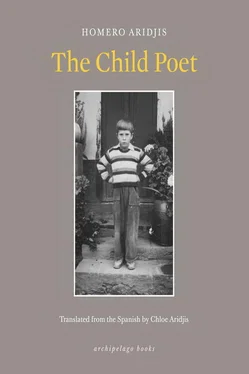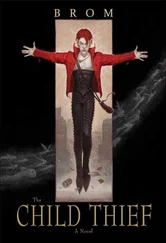One morning in the kitchen, as I sat on a chair watching my mother make lunch, I saw three differing scenes through the three windows, each with its own quality of light, as if the present hour also held the hues of hours past and present.
With a deft hand my mother was sifting sugar over a peach cake, or cutting a vegetable, suddenly saying, “Let’s see …,” as she placed a piece of leftover peach in my mouth.
But I’d barely seen her face near mine, her arm extended towards my mouth, when I’d see her lifting the lid off a pot which, hot and uncovered on the stove, gave off warm clouds of steam that I inhaled.
My mother followed an exact rhythm, picking up the frying pan in a certain way and shaking it gently … if I had wanted to replicate her movements I would have mixed up both the chronology and the way they should go, doing a thing after the one it was meant to precede.
But while a willow’s branches filled the entire space of one window’s panes, and in another the sun-drenched morning seemed to mass into a cloudless blue, watching my mother I would tell myself, “Take a good look at her so you’ll be able to remember her later …”
And as I listened to the noise of pots, the wheeze of the small door to the pantry opening, and the sizzling of oil and peas as they came into contact with the frying pan, and as I saw the bright clear bridge of water pouring out of the jug, I repeated to myself: “So you never forget her …”
For I loved her movements, her way of pointing to a plate, her expression as she prepared meat or a sauce, brushing off my caresses without even noticing she did, or as if she were keeping a bothersome creature at bay. And then, abruptly, she would seem upset by a thing she’d suddenly remembered and startle me, as though it were quite serious, but it’d turn out it was only time to remove the flan from the oven.
To follow her gestures was to feel the rhythm of her being; and to feel it was to divine her inwardness; and to divine that was to remember her one day in a particular attitude, with such and such a face. And to remember her was to have her always in my own past, in the memory of my being, united, inseparably, to my self.
ONE SATURDAY towards noon in January 1951, three friends and I made our way home after playing soccer.
The milky rays of a nearly white sun plowed the damp earth, and our shadows moved neatly beneath our soles each time we lifted a foot to take a step.
The mountain in the shape of a bird spreading its wings looked wrinkled. I felt dirty and tired.
When we reached my house I waved goodbye to my friends, taking the ball with me. Without replying they continued on their way.
As I opened the door I thought of going to my room to lie down and then take a bath. My solitary steps echoed along the sunlit corridor; my parents were at the store.
And then I went into my brother’s room, although I hadn’t meant to go in … A shotgun someone had lent him was propped against the wall. As if moving by their own accord, my hands reached for it. I walked to the backyard and climbed onto a pile of bricks that were being used to build the new kitchen. There was no one around; the bricklayer and the peon were having lunch in the old dining room.
Standing on the bricks, I saw some birds alight on the sapodilla tree next door, to be momentarily covered by the branches … Until they returned to the air, over my head, high in the blue above … And without wanting to, I aimed the shotgun at them and fired, not intending to kill a single one.
I watched with relief as they all flew on until they were lost in the distance. But as I let the shotgun drop, the butt hit the bricks and the second shell fired into me. Such was the blow I felt from the shots that I thought infinity had entered my belly.
Invaded by ammunition, engulfed in the smell of gunpowder, my blood hot and my right hand bleeding, I wasn’t aware of my state until I tried to take a step and a feeling of being torn apart kept me from moving.
Perhaps I had screamed, for the bricklayer and the peon were now below telling me to hang on, that they were going to bring me down from the bricks. But a maid arrived and opened her arms to me and I jumped, nearly throwing her to the ground with the suddenness of my jump and the weight of my body.
She lifted me and carried me to a bed. My parents came into the room, intense suffering on their faces for what had happened to me and the condition I was in. My brother, who’d been summoned from the bathroom in a hurry, looked wet and sad, wrapped in a large towel, crying and trembling.
After examining me the doctor said the wound was superficial, but that it would still be necessary to take me to the city since he didn’t have the necessary instruments to operate.
Then the maid came to tell my mother that the taxi they’d ordered was waiting outside. My father took me in his arms and laid me down on the backseat.
Before we set off, a Texan rancher named Elías drove by in his jeep, and my father asked him to accompany us on our journey in case the car broke down, and he accepted.
With my head resting in my mother’s lap, I stared at the shabby roof of the car as I listened to a song blasting from a cantina, and I wondered which friends might be watching the car drive off, and thinking of God and my fate, I said yes to my accident, as if it were an adverse gift from God.
The taxi indeed broke down on a steep slope as we drove up a mountain between Contepec and El Oro. They put me in the jeep.
I was extremely thirsty and unable to move when at around four in the afternoon we finally reached El Oro. My father got out of the jeep to hunt for the doctor who knew how to operate; waiting for his return, we parked near the main square, where a few curious onlookers came over to inspect me.
After a while my father returned and said the doctor was out of town and wouldn’t be back till Wednesday.
And so we pressed on to Toluca, not arriving until nine at night because the jeep had to go very slowly; my father took me into the first hospital he saw, at the entrance to the city.
It was the General Hospital.
And there, they operated on me.
Hours later I awoke in a room, in bed. My father and mother were watching me. My father said, “Go to sleep. Rest.”
When I opened my eyes again, night had passed and it was Sunday morning. Seated in a chair next to my mother was a lady from Contepec who lived in Toluca and had come to visit me.
My father was not in the room. My mother and the lady were speaking in hushed voices, and each time they looked over at me they would study my face as if searching for clues to my future.
Listening to them, I learned that my father had witnessed my operation and that there had been a moment when the doctors, giving me up as a lost cause, had no longer wanted to continue, but that my father had insisted they persevere till the end.
According to what I heard them say, which was incongruous with the calm I was feeling, the state of my wound was extremely serious; one doctor had said that if they didn’t operate again within the next twenty-four hours I would die from the complications that might arise. But the main doctor who had operated on me disagreed, and they left me to my fate, to see whether I would live or whether I would die.
My thirst grew until I was near delirium … I burned with an inner parchedness that made me grab the bars of my bed and scream. My father would say he was going to get water and return after a long while, saying there wasn’t any but that he’d been able to moisten a ball of cotton with a few drops left in the sink, and then he’d pat my lips with it.
“Let’s wait and see what happens over the next seventy-two hours,” a doctor told my father, believing I was asleep.
Читать дальше












